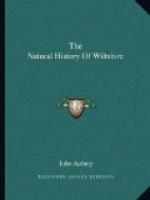Somerset proverb:
“If
you will have a good cheese, and hav’n old,
You
must turn’n seven times before he is cold.”
Jo. Shakespeare’s wife, of Worplesdowne in Surrey, a North Wiltshire woman, and an excellent huswife, does assure me that she makes as good cheese there as ever she did at Wraxhall or Bitteston, and that it is meerly for want of art that her neighbours doe not make as good; they send their butter to London. So it appeares that, some time or other, when there in the vale of Sussex and Surrey they have the North Wiltshire skill, that halfe the cheese trade of the markets of Tedbury and Marleborough will be spoiled.
Now of late, sc. about 1680, in North Wiltshire, they
have altered their fashion from thinne cheeses about
an inch thick, made so for the sake of drying and
quick sale, called at London Marleborough cheese,
to thick ones, as the Cheshire cheese. At Marleborough
and Tedbury the London cheese-mongers doe keep their
factors for their trade. [At the close of the last
century Reading was the principal seat of the London
cheese factors, who visited the different farms in
Wiltshire once in each year to purchase the cheese,
which was sent in waggons to Reading: often by
circuitous routes in order to save the tolls payable
on turnpike roads. — J. B.]
___________________________________
Maulting and Brewing. It is certain that Salisbury mault is better than any other in the West; but they have no more skill there than elsewhere. It is the water there is the chiefest cause of its goodnesse: perhaps the nitrousnesse of the maulting floores may something help.
[Aubrey devotes several pages to these subjects. He particularly commends “The History of Malting, or the method of making Malt, practised at Derby, described for R. T. Esq. by J. F. (John Flamsteed), January 1682-3”, which was printed in “A Collection of Letters for ye Improvement of Husbandry and Trade”, No. 7, Thursday, June 15, 1682. This paper by Flamsteed, which is of considerable length, is inserted by Aubrey in both his manuscripts: a printed copy in the original at Oxford, and a transcript in the Royal Society’s fair copy. — J. B.]
It may be objected how came that great astronomer, Mr. John Flamsteed, to know so much the mystery of malsters. Why, his father is a maulster at Derby; and he himself was a maulster, and did drive a trade in it till he was about twenty yeares of age, at what time Sir Jonas Moore invited him to London. [The best memoir of Flamsteed will be found in “An Account of the Rev. John Flamsteed, the first Astronomer Royal, compiled from his own manuscripts and other authentic documents never before published. To which is added his British Catalogue of Stars, corrected and enlarged. By Francis Baily, Esq. &c. &c. Printed by order of the Lords Commissioners of the Admiralty. London, 1835”. Such is the title of a large quarto volume which my late esteemed




